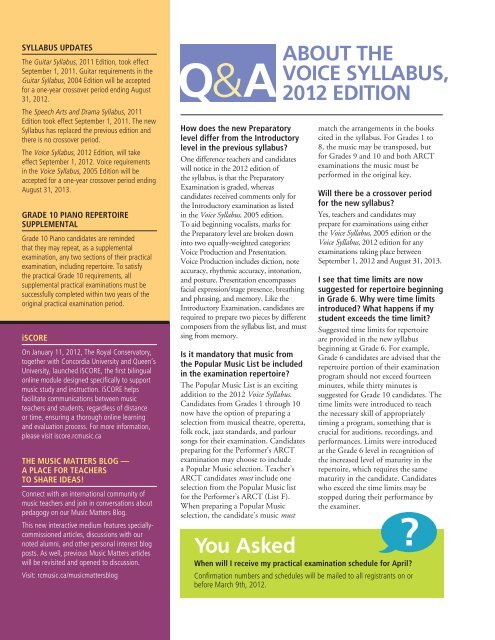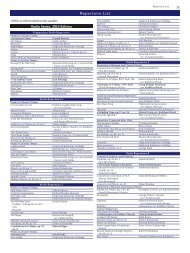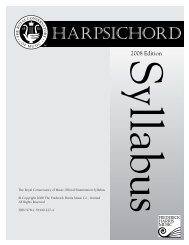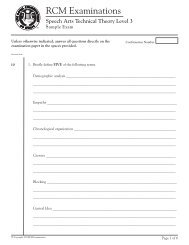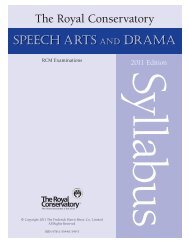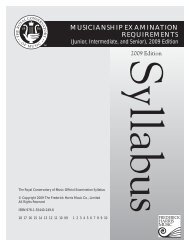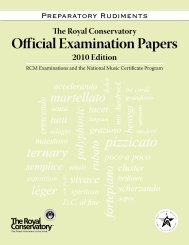Spring 2012 - RCM Examinations
Spring 2012 - RCM Examinations
Spring 2012 - RCM Examinations
Create successful ePaper yourself
Turn your PDF publications into a flip-book with our unique Google optimized e-Paper software.
SYLLABUS UPDATES<br />
The Guitar Syllabus, 2011 Edition, took effect<br />
September 1, 2011. Guitar requirements in the<br />
Guitar Syllabus, 2004 Edition will be accepted<br />
for a one-year crossover period ending August<br />
31, <strong>2012</strong>.<br />
The Speech Arts and Drama Syllabus, 2011<br />
Edition took effect September 1, 2011. The new<br />
Syllabus has replaced the previous edition and<br />
there is no crossover period.<br />
The Voice Syllabus, <strong>2012</strong> Edition, will take<br />
effect September 1, <strong>2012</strong>. Voice requirements<br />
in the Voice Syllabus, 2005 Edition will be<br />
accepted for a one-year crossover period ending<br />
August 31, 2013.<br />
GRADE 10 PIANO REPERTOIRE<br />
SUPPLEMENTAL<br />
Grade 10 Piano candidates are reminded<br />
that they may repeat, as a supplemental<br />
examination, any two sections of their practical<br />
examination, including repertoire. To satisfy<br />
the practical Grade 10 requirements, all<br />
supplemental practical examinations must be<br />
successfully completed within two years of the<br />
original practical examination period.<br />
iSCORE<br />
On January 11, <strong>2012</strong>, The Royal Conservatory,<br />
together with Concordia University and Queen’s<br />
University, launched iSCORE, the first bilingual<br />
online module designed specifically to support<br />
music study and instruction. iSCORE helps<br />
facilitate communications between music<br />
teachers and students, regardless of distance<br />
or time, ensuring a thorough online learning<br />
and evaluation process. For more information,<br />
please visit iscore.rcmusic.ca<br />
THE MUSIC MATTERS BLOG —<br />
A PLACE FOR TEACHERS<br />
TO SHARE IDEAS!<br />
Connect with an international community of<br />
music teachers and join in conversations about<br />
pedagogy on our Music Matters Blog.<br />
This new interactive medium features speciallycommissioned<br />
articles, discussions with our<br />
noted alumni, and other personal interest blog<br />
posts. As well, previous Music Matters articles<br />
will be revisited and opened to discussion.<br />
Visit: rcmusic.ca/musicmattersblog<br />
8 examinations.rcmusic.ca<br />
Q&A<br />
How does the new Preparatory<br />
level differ from the Introductory<br />
level in the previous syllabus?<br />
One difference teachers and candidates<br />
will notice in the <strong>2012</strong> edition of<br />
the syllabus, is that the Preparatory<br />
Examination is graded, whereas<br />
candidates received comments only for<br />
the Introductory examination as listed<br />
in the Voice Syllabus, 2005 edition.<br />
To aid beginning vocalists, marks for<br />
the Preparatory level are broken down<br />
into two equally-weighted categories:<br />
Voice Production and Presentation.<br />
Voice Production includes diction, note<br />
accuracy, rhythmic accuracy, intonation,<br />
and posture. Presentation encompasses<br />
facial expression/stage presence, breathing<br />
and phrasing, and memory. Like the<br />
Introductory Examination, candidates are<br />
required to prepare two pieces by different<br />
composers from the syllabus list, and must<br />
sing from memory.<br />
Is it mandatory that music from<br />
the Popular Music List be included<br />
in the examination repertoire?<br />
The Popular Music List is an exciting<br />
addition to the <strong>2012</strong> Voice Syllabus.<br />
Candidates from Grades 1 through 10<br />
now have the option of preparing a<br />
selection from musical theatre, operetta,<br />
folk rock, jazz standards, and parlour<br />
songs for their examination. Candidates<br />
preparing for the Performer’s ARCT<br />
examination may choose to include<br />
a Popular Music selection. Teacher’s<br />
ARCT candidates must include one<br />
selection from the Popular Music list<br />
for the Performer’s ARCT (List F).<br />
When preparing a Popular Music<br />
selection, the candidate’s music must<br />
ABOUT THE<br />
VOICE SYLLABUS,<br />
<strong>2012</strong> EDITION<br />
match the arrangements in the books<br />
cited in the syllabus. For Grades 1 to<br />
8, the music may be transposed, but<br />
for Grades 9 and 10 and both ARCT<br />
examinations the music must be<br />
performed in the original key.<br />
Will there be a crossover period<br />
for the new syllabus?<br />
Yes, teachers and candidates may<br />
prepare for examinations using either<br />
the Voice Syllabus, 2005 edition or the<br />
Voice Syllabus, <strong>2012</strong> edition for any<br />
examinations taking place between<br />
September 1, <strong>2012</strong> and August 31, 2013.<br />
I see that time limits are now<br />
suggested for repertoire beginning<br />
in Grade 6. Why were time limits<br />
introduced? What happens if my<br />
student exceeds the time limit?<br />
Suggested time limits for repertoire<br />
are provided in the new syllabus<br />
beginning at Grade 6. For example,<br />
Grade 6 candidates are advised that the<br />
repertoire portion of their examination<br />
program should not exceed fourteen<br />
minutes, while thirty minutes is<br />
suggested for Grade 10 candidates. The<br />
time limits were introduced to teach<br />
the necessary skill of appropriately<br />
timing a program, something that is<br />
crucial for auditions, recordings, and<br />
performances. Limits were introduced<br />
at the Grade 6 level in recognition of<br />
the increased level of maturity in the<br />
repertoire, which requires the same<br />
maturity in the candidate. Candidates<br />
who exceed the time limits may be<br />
stopped during their performance by<br />
the examiner.<br />
You Asked<br />
When will I receive my practical examination schedule for April?<br />
Confirmation numbers and schedules will be mailed to all registrants on or<br />
before March 9th, <strong>2012</strong>.


